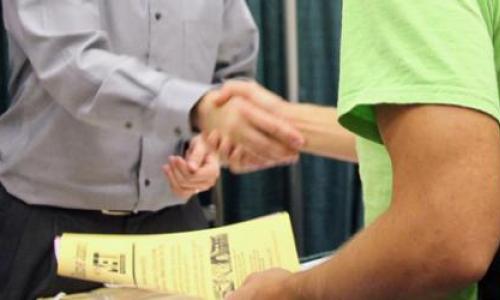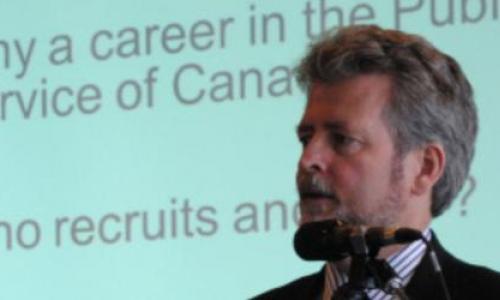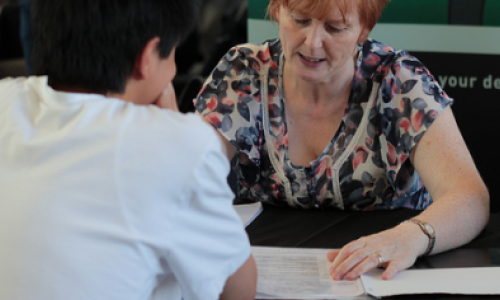
Busy week! Sometimes it seems like there’s a never-ending stream of students to see, employers to contact, people to follow up with, meetings to attend, and… well, blog articles to write!
We had a good fortune up here at SFU to be a part of Sean Aiken’s “Discover Your Passion” tour. Don’t recall the name, Sean Aiken? You may remember him as the 52 jobs in 52 weeks guy – a few years ago Sean started a project called “One Week Job,” in which he decided to try out a bunch of different jobs after he graduated from his university degree. Right now he’s doing a tour of schools and colleges, sharing his story with generation Y. At SFU we got to see an educational cut of the documentary he made about his experience. He also shared many personal messages with the lucky students in attendance that echo not only many of the sentiments that I have written about here, but much of the underlying philosophy of how we do things at Career Services. Overall, it was definitely a thumbs-up experience. Thanks, Sean and the “One Week Job” crew!
I started to talk about empathy, particularly as a mechanism for personal growth. This week I thought that looking at a more specific and practical application of empathy would be useful – namely the role that empathy might play in a job interview.
Empathy is an inherent part of all human interactions, whether we are aware of the fact or not. Research in neuroscience has unveiled some pretty exciting stuff – suggesting that we are wired for empathy at the level of neurons in the brain. At a very fundamental level, we are constantly assessing the other people around us, providing us with some timely information on what other people are likely to be thinking and/or feeling, and helping us to act accordingly. Without this ability, we would be purely and truly self-centred, relying only on internal and certain environmental cues only. We’d be sociopaths, in a way (but not really – actual sociopaths usually know how to seem incredibly empathic).
Job interviews are a special kind of human interaction (or as I sometimes jokingly say to students, they are a special kind of hell). I’m not sure they compare that well with any other kind of human relationship that one might expect to engage in. They are contrived and based mostly on evaluation, stereotypically from one side (but in reality this evaluation is mutual – you have a decision to make, too). A good interviewer will be able to efficiently confirm a candidate’s qualifications and experience and assess their fit with the company culture, among other things, all while making the interviewee as relaxed as possible.
Because of research that suggests most job interviewers make their hiring decisions within the first 5 minutes of a job interview, the relationship that an interviewee is able to establish with the interviewer, within a very small amount of time, is crucial. This is not to say that your performance in the remainder of the interview becomes meaningless – but that elusive “first impression” will invariably colour the way the interviewer interprets your responses throughout the interview.
Empathy is the cornerstone of any effective human relationship. Being able to identify what’s going on for other people and using that information to act accordingly allows us to both tighten and sever bonds with others (think of the last time you were really pissed off with someone – bet you knew exactly what to say to piss them off in return). In a job interview setting, it only takes a few small gestures or actions within that first 5 minutes to demonstrate your empathic attitude.
We’re not talking about mind-reading here. Rather, the embracing of a basic attitude of understanding in combination with simple and subtle verbal and non-verbal communication strategies. Because a job interview is a conversation, interchanges are going to be taking place, and there is lots of room for you to impress with empathy. The first step is to master active listening – really paying attention to what the interviewer is saying (verbally and non-verbally). Having a square, open, relaxed posture and maintaining an appropriate level of eye contact are essentials here. Try to paraphrase things that the interviewer says, using different and succinct wording. All of this will make the interviewer feel that you are listening and that you care about the position, the organization, hey – maybe even them!
Job interviews are an unflinchingly human encounter. Let’s treat them as such!
Beyond the Blog
-
The CSI Blog is hosted by SFU Career Services. Visit the CS website to view job postings, book a career advising appointment, register for workshops and more.
















